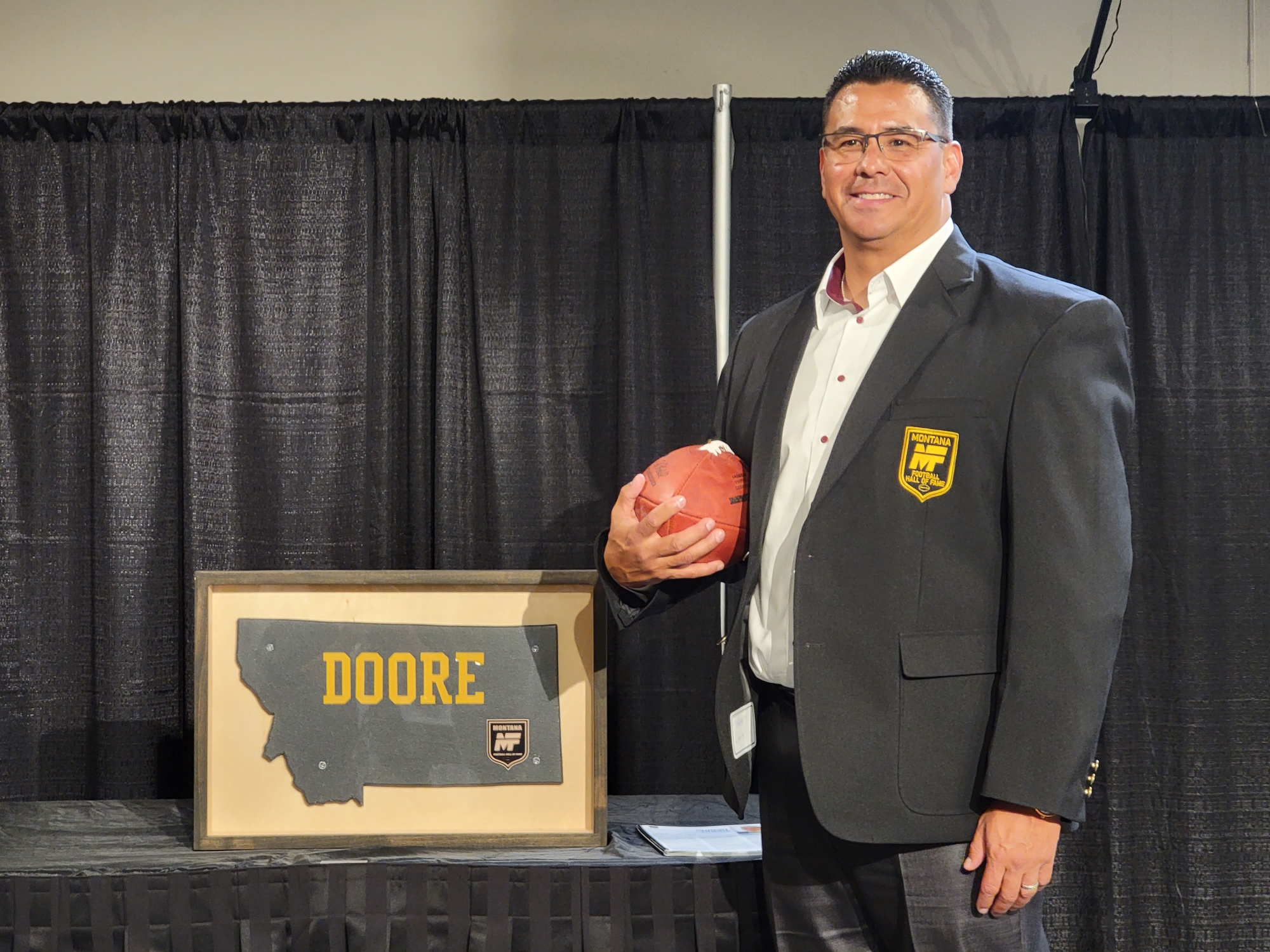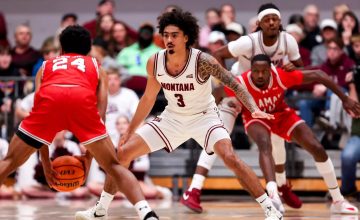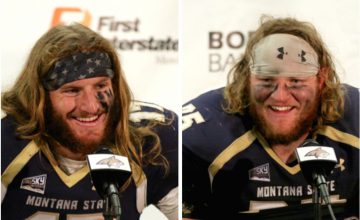The famed Sports Illustrated issue that hit mailboxes in February of 1991 is best remembered for the legends on the cover.
“Watch out world! This could be America’s 1992 Olympic Five” reads the sub headline, centered between a photo of Michael Jordan, Magic Johnson, Charles Barkley, Patrick Ewing and Karl Malone.
It’s the most impactful periodical I’ve ever picked up. It’s the magazine issue I remember most from childhood, the one that made me want to become a sportswriter because of one story, a beautiful work chronicling basketball on Montana Indian reservations.

It wasn’t the “Dream Team” cover story. And I was not reading Gary Smith’s unforgettable article until a handful of years after it was initially published.
In the same issue as Jack McCallum’s article that first dubbed America’s juggernaut for the 1992 summer Olympics in men’s basketball the “Dream Team” is Smith’s astounding, poignant story “Shadows of a Nation.”
The sub-headline of Smith’s epic story reads: “The Crows, once proud warriors, now seek glory—but often find tragedy—in basketball.”
Smith’s stunning, tragic prose tell the story of Jonathan Takes Enemy, a legend among Montana’s Native American people, a supremely talented yet tortured standout from Hardin who rose to great heights in high school but could never conquer the game or his demons after his prep career ended.
It also tells of legends like Elvis Old Bull, the Lodge Grass star that dominated Class B in the late 1980s in Montana, continuing the impressive legend of Indian basketball players in these parts.
Smith’s story opens with: Singing. Did you hear it? There was singing in the land once more that day. How could you not call the Crows a still-mighty tribe if you saw them on the move that afternoon? How could your heart not leave the ground if you were one of those Indian boys leading them across the Valley of the Big Horn?
The words, the scenes, were all so tragically compelling and thought provoking. But that struggle seemed non-relatable to the Montana Natives I know best.
Shadows of a Nation by Gary Smith
My younger brother and I grew up with the LaValley brothers, a pair of Blackfeet that also lived in Missoula. Michael, R.J. and their parents Shane and Rolanda taught us a great deal about their Native culture from a young age.
Smith’s article painted a different picture. The story, the people of Montana, our personal friends – it made Montana’s Native American culture a nearby neighbor for my brother and I growing up in the Garden City.
I first met Robert RidesattheDoor when I was a teenager. Robert is Mike and R.J.s uncle. Rolanda LaValley, Robert’s older sister, remains one of my mother Suzanne’s longest and dearest friends. The family unit their tribe brings everywhere is impossible to ignore and impossible to not feel inspired by.
Among the quotes from Gary Smith’s memorable prose in that SI more than three decades ago that struck me then and still lingers with me now is the quote from Jonathan Takes Enemy’s brother, James, when James says “Every Indian that leaves (the reservation) has a rubber band attached to his back.”

The legend of Native basketball players in the state of Montana is one of the richest examples of the mystique connected to athletics in our proud state. But so often, as Smith chronicled so sharply, the Treasure State’s great Indian stars would struggle in hoops, in school and in life when they left the reservation.
My friends didn’t seem to experience similar struggles, nor did Robert and his growing family, nor did the elders of the clan.
Robert RidesattheDoor — who like his father and grandfather before him, goes by Doore in the professional world — followed in his elders’ footsteps, learning to live in this fast-paced world we share while maintaining old-world traditions. He and his family have proven you can pursue successes in the 21st century while maintaining the stories, teachings and language of our past.
From a standout multi-sport athlete at Browning High School to the highest-ranking Native American executive in the NFL since Jim Thorpe was president of the league back in 1920, Robert has achieved at a high level in modern life while always keeping his Pikuni roots close to his heart.
“I was raised in the Pikuni way, the teachings of the Blackfeet from my parents and that’s my foundation,” Doore, an inductee in the Montana Football Hall of Fame class of 2022, said on Nuanez Now on ESPN Radio in April of this year. “You have to balance the two worlds you live in. The tribal one and the non-tribal one. And if you are successful in both, you can manage both.”

Doore and his family have done a tremendous job of that balance. Although basketball is close to religion on Montana’s Indian reservations, football has been a primary mechanism, particularly for the men of the clan.
Doore’s parents are Darnell and Smokey RidesattheDoor, who are dignitaries in the Blackfeet tribe. Darnell’s brother, Doug Davis, played football at Montana State, including on MSU’s 1984 national championship team.
Doug has five sons. His oldest Leo was a starting offensive tackle for Montana State’s back-to-back Big Sky Conference championship football teams in 2010 and 2011. During those same years, Steven Davis was a member of the MSU basketball team.
Matt and Ryan played football at Montana State as well. Matt also stood out in rodeo at MSU in the mid-2010s. Ryan was a captain tight end during Montana State’s epic run last fall, culminating in the first national championship game appearance in nearly 40 years.

“We come from a long line of warriors,” Robert said. “Pixie Kipp was my great uncle and he was drafted by the Detroit Lions out of Western Montana College. That’s my lineage.
“Doug, Leo, Matt, Ryan, they all played for the ‘Cats. Doug and my uncles were my heroes growing up, the ones who made me notice football back in the 1980s. They started to make football in Browning cool. A bunch of runners and basketball players, but football, it started to become popular.”
That love of football also trickled in when it came to a love of the NFL, particularly the team formerly known as the Washington Redskins. Robert would watch the games on Sundays with his father and brother.
He remembers seeing Brent Musburger, a 2021 Montana Football Hall of Fame inductee, doing a live shot during an NFL game as Musburger stood on the rim rocks in the Billings Heights. That was the first time Robert realized that “a Montana boy could make it all the way to the NFL.”
The Washington franchise used a logo for decades that was fashioned after Chief Two Guns White Calf of the Blackfeet Nation, a part of the family’s rich and abundant lineage across the state and region. That was also a draw for Robert and his friends while growing up on the reservation to become fans of the franchise.
They played for the Browning Indians and wore Washington gear with a logo fashioned after an influential tribal elder.
The name RidesattheDoor also has a unique meaning. I remember sitting with Smokey and Darnell following Senior Night for Missoula Big Sky boys’ basketball in 2009.
That evening, Smokey had gifted his grandson, Mike, along with my brother, Brooks, and the other Big Sky seniors with eagle feathers in a traditional Blackfeet ceremony. Following the game, Smokey explained the significance of the ceremony to help the young men transition into adults. He also told us the origin of “RidesattheDoor.”
As a young man, Smokey’s father stole “The best horse from the rival Crow, which was tied to the chief’s door and rode into the sunset.”
“The translation of the Pikuni name is ‘he who rides the best horse at the enemy’s door,” Robert remembered years later.
When Leo Davis was a senior at Montana State, I wrote a profile on the offensive tackle and his family. Darnell shared with me some of the reasons why sports are so important in Blackfeet and Native American culture, particularly when it comes to the symbolism of young people’s right of passage into women and men.
Back in October of 2011, I wrote for the Bozeman Daily Chronicle about the dynamic:

Today, like each Saturday for the past four years, Leo Davis will do his best to “count coup.” And just as they have each home Saturday at Bobcat Stadium, those who take pride in his accomplishments will be there to see the Montana State offensive lineman as he carries the banner of his people.
But today is different. It’s family weekend on the MSU campus. Look around. You will see No. 50 jerseys in hoards. The cheers coming from those wearing Davis jerseys will be as loud as ever. The young warrior will enter his combat arena buoyed by a “warrior song” sung by more than 150 family members as his Bobcats take on Northern Arizona.
Davis and his four younger brothers, sons of Deborah, a Lower Brule Lakota and Doug, a Blackfeet, are accustomed to overwhelming family support. Dozens of family members come to Bobcat football games each Saturday to cheer on Davis and his brother, Matthew, a freshman walk-on this fall.
Davis’ relatives come here during winter as well, as Leo’s brother, Steven, is a 6-foot-7 forward on the MSU basketball team. The support given to these modern-day warriors is deep-seated in the family.
It’s also woven in the fabric of the family’s Native American heritage.
“Not only are we a close family, but it comes from our culture, our traditions,” said Leo’s aunt and Doug’s sister, Darnell RidesAtTheDoore. “These are our young warriors. This is a different type of warrior situation. You compare it to the parallels of the past when young men went out and did great things, counted coup. Then the family could tell their coup stories with great pride. Those who counted coup were the ones people looked up to, the heroes, the ones you wanted your young boys to be like.
“These are young warriors out there making history, but also writing their own legend and the legend of our people. Leo has done that tenfold. He is a warrior we look up to, someone who brings our people much pride. So (today) before the game, we will sing him out onto that battlefield.”
MODERN DAY WARRIOR by COLTER NUANEZ

It’s a similar coming of age that led Robert RidesattheDoor to sports and to football. That passage from boy to man, the representation of his family and his people, is what helped his rise through the ranks of the National Football League.
And that perseverance, that ability to live in two worlds, is what helped Robert earn induction into the Montana Football Hall of Fame.
During his time in the NFL, Robert remembers, “floating almost every day because I was truly living my dream come true.” The kid from Browning proved it’s possible to grow up on the reservation and earn your way into an NFL front office, all while maintaining pride in your people’s heritage and pushing the envelope forward for those that come next.
The tie to family is what ultimately caused Robert to step away from professional football.
“My dream was to make it to the top of the NFL,” Doore said. “After a Monday Night Football Game, you turn your TV off as a fan and go to bed. I was a first in, first out guy and my responsibility in the NFL was shutting down the stadium. I wouldn’t get home until 4 a.m.
“Then I would wake up and do it all over again. One night, or early morning, I looked at my kids and realized they had gotten older. The sacrifices I was making following a dream were colliding with missing out on being a dad and being a husband. That was an emotional time but I realized the shelf life had expired. And then I knew I needed to give my kids a chance to see who they became.”
What we love about sports so much, especially in a rural place like Montana, is this same coming of age ceremony many of the Treasure State’s indigenous peoples find so connected to competition and sport.
While Smith’s epic tale was also one of tragedy, the story of Robert RidesattheDoor and his family is one of triumph.
In a time muddled with unrelenting noise, straddling a balance between old world traditions and new age pursuits is an undeniable challenge.
Like his grandparents and parents before him, Robert RidesatheDoor is the latest shining example for his family and his people how to balance the challenge with grace and dignity.














